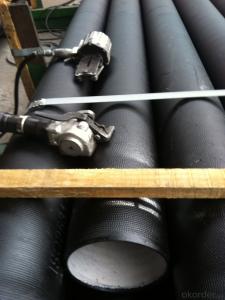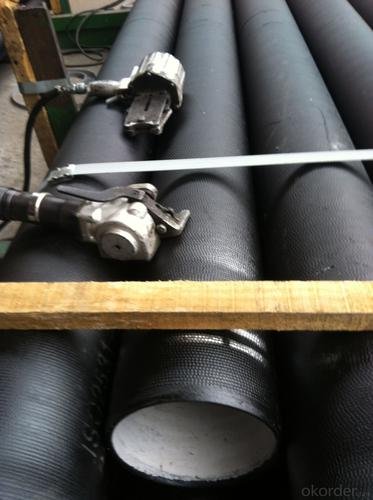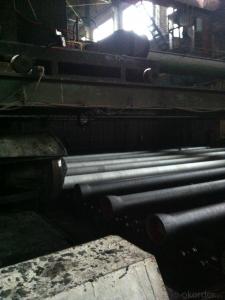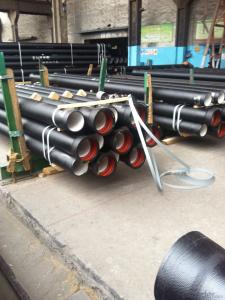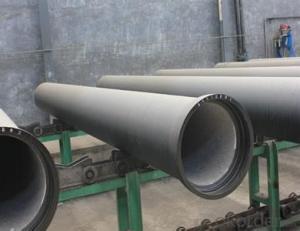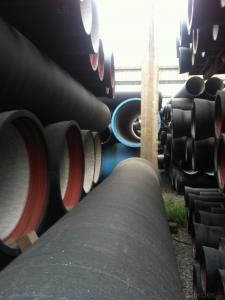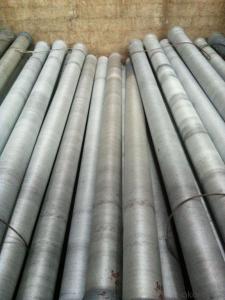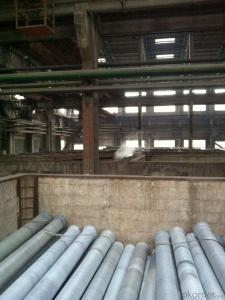DUCTILE IRON PIPE AND PIPE FITTINGS K7 CLASS DN600
- Loading Port:
- Tianjin
- Payment Terms:
- TT OR LC
- Min Order Qty:
- 23 pc
- Supply Capability:
- 3000 pc/month
OKorder Service Pledge
OKorder Financial Service
You Might Also Like
· Material : Ductile Cast Iron
· Size Range : DN 80mm to DN 2000mm
· Unit Effective Length : 6m or 5.7m
· Manufacture Standard: ISO 2531:1998/ EN 545:2006/EN 598:2007
· Annual capacity : 200,000 tons
· Coating Exterior: Zinc 130g/m2 according to ISO 8179-1 and bitumen coating 70 microns.
· Cement Interior: Portland Cement/ High Alumina Cement/ Sulphate Resisting Cement Lining according to ISO 4179
· Special requirements on external coating and internal lining can be applied
· We also provide accessories such as SBR/EPDM rubber gaskets, lubricant paste, pipe caps, PE sleeves, etc.
Additional Parts:
Each pipe is strictly inspected according to related standard to ensure permanently high performance.
Easy Installation at site and service free for life
Long Service Lifespan
Quotation will arrive you within 24hours once we get your inquiry.
We guarantee offering you a competitive price.
A copy of original inspection reports of pipes will be offered after shipment.
Photos of loading process will be sent to the customer after shipment effect.
We will follow-up the delivery progress after shipment effect and update to the customer on weekly basis.
- Q: What is the expected leakage rate for ductile iron pipes?
- The expected leakage rate for ductile iron pipes can differ depending on various factors like the pipes' age, condition, and installation approaches, as well as the quality of materials employed. Nevertheless, ductile iron pipes generally have a reputation for being durable and having low leakage rates compared to other pipe materials. Based on industry standards and research studies, well-maintained ductile iron pipes are expected to have a leakage rate as low as 0.1% per year. This implies that, on average, less than 1 liter of water may leak per meter of pipe length annually. However, it is important to note that this is an average value and actual leakage rates can vary. Regular maintenance and inspections are crucial in minimizing leaks and ensuring the longevity of ductile iron pipes. Additionally, proper installation techniques, such as using effective jointing methods and appropriate bedding and backfill materials, can also contribute to reducing leakage rates. To determine the expected leakage rate for specific ductile iron pipe installations, it is recommended to consult industry professionals and adhere to applicable standards and regulations.
- Q: An urban infrastructure construction, water supply pipe is ductile iron pipe and PE pipe, thank you
- Because the construction of municipal water supply pressure will be relatively large, generally used in the selection of pipe centrifugal ductile iron pipe, he has properties of iron essence and steel, excellent corrosion resistance, good ductility, good sealing effect, simple installation, ductile iron pipe is mainly used for municipal, industrial and mining enterprises, water supply, gas, oil etc.
- Q: Do ductile iron pipes require special handling during transportation?
- Yes, ductile iron pipes do require special handling during transportation. Ductile iron pipes are known for their strength and durability, but they can be susceptible to damage if not handled properly. These pipes are heavy and can be quite large in size, so it is important to use appropriate lifting and handling equipment during transportation. Special care should be taken to avoid dropping or impacting the pipes, as this can lead to cracks or fractures. Additionally, pipes should be stored and transported in a way that prevents them from rolling or shifting, which could cause damage to the pipe coating or fittings. It is also recommended to protect the pipes from exposure to extreme temperatures or weather conditions during transportation. By following these guidelines and taking the necessary precautions, the risk of damage to ductile iron pipes during transportation can be minimized.
- Q: What are the different methods for repairing ductile iron pipe?
- There are several methods for repairing ductile iron pipe, including mechanical repair, epoxy repair, and welding. Mechanical repair involves using clamps or couplings to seal leaks or cracks in the pipe. Epoxy repair involves applying an epoxy coating or sealant to the damaged area to prevent further corrosion or leaks. Welding is another method used for repairing ductile iron pipe, where the damaged section is cut out and replaced with a new piece that is welded into place.
- Q: Are ductile iron pipes suitable for use in hydroelectric dams?
- Yes, ductile iron pipes are suitable for use in hydroelectric dams. Ductile iron is a type of iron that has a higher degree of flexibility and strength compared to traditional cast iron. This makes it an ideal choice for many applications, including water transmission systems in hydroelectric dams. Ductile iron pipes are known for their durability and resistance to corrosion, which is crucial in a dam environment where water exposure is constant. They can withstand high pressures and extreme temperatures, making them suitable for the demanding conditions found within hydroelectric dams. Additionally, ductile iron pipes have excellent joint integrity, ensuring that they remain leak-proof and reliable over their lifespan. This is important for maintaining the efficiency and effectiveness of a hydroelectric dam's water transmission system. Furthermore, ductile iron pipes are cost-effective compared to other materials, such as steel or concrete. They have a long service life, require minimal maintenance, and are readily available, making them a practical choice for hydroelectric dam projects. In conclusion, ductile iron pipes are a suitable choice for use in hydroelectric dams due to their durability, resistance to corrosion, high-pressure tolerance, joint integrity, and cost-effectiveness. They provide the necessary strength and flexibility to efficiently transport water within the dam, contributing to the overall success and longevity of the hydroelectric power generation system.
- Q: What's the function of the cement mortar lining of ductile iron pipes?
- You may easily say that this statement is vague and there is no evidence that other manufacturers often do so when promoting other types of lining. However, in order to prove the truth of the above view, we have compiled sufficient examples to demonstrate the reliability of each of these statements from a scientific and logical point of view.We have stated each of these fields and other embedded systems as specious statements. There is only a reasonable conclusion that the cement mortar lining (CML) provides excellent protection for ductile iron pipes and steel tubes.Ductile iron pipe and steel pipe CML CML produces a synergistic effect of the incomparable.
- Q: What are the different pressure classes available for ductile iron pipes?
- The different pressure classes available for ductile iron pipes typically range from Class 150 to Class 350.
- Q: Ductile iron pipes lined with cement mortar in the water (living water, water in the 6.9-7.3) in the early pH, why pH increased? How to solve this problem?
- The basic characteristic of ductile iron pipe of ordinary cement mortar lining the inner wall of the tube will make passivation, have antiseptic effect, but in the initial stage of using cement mortar lining will be the alkali component separation, so that the pH value of water increased to influence water quality
- Q: What are the interface forms of ductile iron pipes? The best drawings are available. Thank you
- Because of this interface and the corresponding T sealing aprons can withstand greater deflection angle and greater tolerances, especially suitable for unstable formations and corners.
- Q: How are ductile iron pipes protected during transportation and storage?
- Ductile iron pipes are protected during transportation and storage through various methods to ensure their integrity and prevent any potential damage. Firstly, these pipes are typically coated with a protective layer, such as epoxy or zinc, which acts as a barrier against corrosion. This coating helps to safeguard the pipes from moisture and other corrosive elements during transit and storage. Additionally, ductile iron pipes are often bundled together and secured with straps or bands to prevent any movement or shifting that could lead to mechanical damage. This bundling also makes it easier to handle and transport the pipes in a more organized manner. During transportation, the pipes are usually loaded onto pallets or placed in crates to provide added protection and stability. This helps to minimize the risk of any accidental impact or rough handling that could potentially cause cracks or fractures. Furthermore, proper labeling and marking of the pipes is essential to ensure that they are handled appropriately. This includes displaying handling instructions, weight limits, and pipe specifications, which helps prevent mishandling and damage during transportation. Moreover, storage conditions are crucial to maintaining the integrity of ductile iron pipes. They should be stored in a clean, dry, and well-ventilated area to prevent exposure to moisture and humidity. Pipes should be kept away from direct sunlight and extreme temperatures to avoid any potential degradation of the protective coating. In conclusion, protecting ductile iron pipes during transportation and storage involves applying protective coatings, bundling and securing them, utilizing appropriate packaging materials, ensuring proper handling and labeling, and storing them in suitable conditions. These measures aim to maintain the quality and structural integrity of the pipes, ensuring they arrive at their destination in optimal condition.
Send your message to us
DUCTILE IRON PIPE AND PIPE FITTINGS K7 CLASS DN600
- Loading Port:
- Tianjin
- Payment Terms:
- TT OR LC
- Min Order Qty:
- 23 pc
- Supply Capability:
- 3000 pc/month
OKorder Service Pledge
OKorder Financial Service
Similar products
Hot products
Hot Searches
Related keywords
